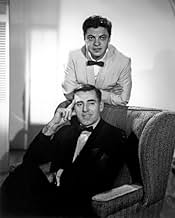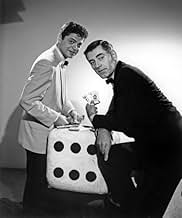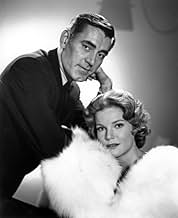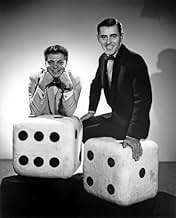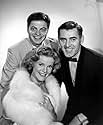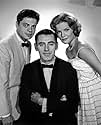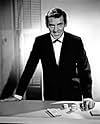Un gran barco que navegaba en aguas internacionales permite a sus clientes jugar toda la noche. El señor Lucky, propietario y, junto con su ayudante Andamo, se ocupaban de clientes problemát... Leer todoUn gran barco que navegaba en aguas internacionales permite a sus clientes jugar toda la noche. El señor Lucky, propietario y, junto con su ayudante Andamo, se ocupaban de clientes problemáticos, delincuentes y policías.Un gran barco que navegaba en aguas internacionales permite a sus clientes jugar toda la noche. El señor Lucky, propietario y, junto con su ayudante Andamo, se ocupaban de clientes problemáticos, delincuentes y policías.
- Premios
- 1 nominación en total
Explorar episodios
Opiniones destacadas
I was nine-years old (and living in New York) when this show premiered, and it quickly became my favorite series. Friday nights meant "77-Sunset-Strip" and then staying up to watch "Mr. Lucky" with a big bottle of Coke and a bag of Fritos. I can still remember the car he drove -- a black 1959 Chrysler Imperial. To me, Mr. Lucky was the epitome of "class."
During the summer of 2004 we happened upon the derelict, rusting hulk of the Fortuna moored to a dock in Eureka, California. The harbor master pointed it out to us as what was left of the yacht used on the TV series.
Lord only knows what the poor thing had gone through after being decommissioned by Hollywood. The harbor master intimated it might have been used as a drug running boat to and from Mexico.
In any event, a peek through its windows from dockside revealed it is now being used as a storage facility for various boat machinery and parts.
Lord only knows what the poor thing had gone through after being decommissioned by Hollywood. The harbor master intimated it might have been used as a drug running boat to and from Mexico.
In any event, a peek through its windows from dockside revealed it is now being used as a storage facility for various boat machinery and parts.
TV actors, at least in the old days when they were placed in a separate class from movie actors, often seemed to be clones of their movie brethren. Some were singular in their associations. Nehemiah Persoff seemed to be the Edward G. Robinson of television, getting similar roles and acting them in a very similar manner. Carolyn Jones was the Bette Davis of TV, even to the point of playing a set of sisters one of whom is a murderer on Burke's Law. Other's had company in their pursuits. The western stars were all either John Wayne or Gary Cooper, with an occasional Jimmy Stewart or Henry Fonda thrown in, (including the real thing on "The Deputy"). There were a whole selection of Clark Gables, including John Russell, Rory Calhoun, Richard Egan , Robert Lowery and others. There were plenty of Brandos, including Burt Reynolds, George Maharis and John Saxon. There were enough Rock Hudsons to fill a theater, with John Gavin, Tom Tryon and Gardner McKay coming immediately to mind. The blonde versions I call the "Redfords", a group of thoughtful , well educated types of which Robert Redford was one along with James Franciscus, Richard Chamberlain and William Shatner. They had varying degrees of success with Redford emerging as the head of the class.
Perhaps the most successful strain, however were the Cary Grants. Grant made an ideal model for the suave detective hero, able to be charming or tough as the occasion demanded. Craig Stevens was hired to play Peter Gunn specifically because of a strong resemblance to Grant. His tightlipped performance was not really very charming but it's surely how Cary would have played that character. Latern-jawed John Vivyan played a role that Grant had actually essayed in the movies, Mr. Lucky. He was competent at best. The heroes of the Warner Brother's detective shows were largely based on Cary Grant. Ephram Zimbelist Jr.'s Stu Bailey was a grant-style role with a lot more charm than Peter Gunn. Richard Long's Rex Randolph on Bourbon Street Beat was much the same. Anthony Eisley's Tracy Steele was a less convincing version of the same character on Hawaiian Eye.
But the best of the Grant clones was Gene Barry. He was male-model handsome, had good breeding and seductive whiskey voice. He was also TV's greatest reactors. He had a series of comic takes that was perfect for Amos Burke, who had to confront an unending series of eccentric subjects. Yet he could turn around and romance the ladies or get tough with the tough guys. And he was a good enough actor to hold up his end when the heavy dramatics intervened.
One wonders what the originals of these clones must have thought as they watched the boob tube in it's infancy.
Perhaps the most successful strain, however were the Cary Grants. Grant made an ideal model for the suave detective hero, able to be charming or tough as the occasion demanded. Craig Stevens was hired to play Peter Gunn specifically because of a strong resemblance to Grant. His tightlipped performance was not really very charming but it's surely how Cary would have played that character. Latern-jawed John Vivyan played a role that Grant had actually essayed in the movies, Mr. Lucky. He was competent at best. The heroes of the Warner Brother's detective shows were largely based on Cary Grant. Ephram Zimbelist Jr.'s Stu Bailey was a grant-style role with a lot more charm than Peter Gunn. Richard Long's Rex Randolph on Bourbon Street Beat was much the same. Anthony Eisley's Tracy Steele was a less convincing version of the same character on Hawaiian Eye.
But the best of the Grant clones was Gene Barry. He was male-model handsome, had good breeding and seductive whiskey voice. He was also TV's greatest reactors. He had a series of comic takes that was perfect for Amos Burke, who had to confront an unending series of eccentric subjects. Yet he could turn around and romance the ladies or get tough with the tough guys. And he was a good enough actor to hold up his end when the heavy dramatics intervened.
One wonders what the originals of these clones must have thought as they watched the boob tube in it's infancy.
I recently got the DVD set of this classic TV show which I haven't seen in 60 years. Back then I had a genuine fascination with Mr. Lucky and his adventures. It may have been the dark edgy atmosphere, the mystery surrounding star John Vivyan's character, or the strong chemistry between the cast members themselves. Above all, it was Henry Mancini's magnificent music that really made the show a hit.
One point that needs to be mentioned is the reason why the show went off the air. Those of us who were alive back in 1959 recall that America was a very different place when it came to public mores, and for its time, Mr. Lucky was quite daring for a television show. Its protagonist was a complex character with a shady past, a professional gambler running a barely legal casino outside the three-mile limit. Along with all the gambling, there was lots of excessive drinking, smoking, partying, and overt sexual innuendos in the dialogue. Not to mention that Lucky and his lady friend Maggie had an "open relationship" when it came to commitment.
Soon CBS and sponsor Lever Brothers received flak from viewers in the South and Midwest concerning the show's alleged "immorality". This is partly why the show's format was changed mid-season from a casino to a swank supper club. However, this was not enough to placate viewers in the Bible belt. Thus, in spite of the shows' strong viewership and high ratings, Lever Brothers refused to renew its contract. Because the show was so hot, CBS was unable to find another sponsor. And so, to the great regret of its audience, Mr. Lucky was subsequently canceled, its last episode airing in September of 1960.
Back then Mr. Lucky was considered to be way too much over the top and paid the penalty for being ahead of its time. Today a show such as this would be a hit on TV but also probably be rated PG because of all the smoking and drinking.
For myself however, seeing this classic TV show once again and hearing the beautiful Henry Mancini score brings back warm memories of a simpler time, when television was indeed real entertainment.
And now, as Andamo ( Ross Martin) would say- "That's it and that's all!"
One point that needs to be mentioned is the reason why the show went off the air. Those of us who were alive back in 1959 recall that America was a very different place when it came to public mores, and for its time, Mr. Lucky was quite daring for a television show. Its protagonist was a complex character with a shady past, a professional gambler running a barely legal casino outside the three-mile limit. Along with all the gambling, there was lots of excessive drinking, smoking, partying, and overt sexual innuendos in the dialogue. Not to mention that Lucky and his lady friend Maggie had an "open relationship" when it came to commitment.
Soon CBS and sponsor Lever Brothers received flak from viewers in the South and Midwest concerning the show's alleged "immorality". This is partly why the show's format was changed mid-season from a casino to a swank supper club. However, this was not enough to placate viewers in the Bible belt. Thus, in spite of the shows' strong viewership and high ratings, Lever Brothers refused to renew its contract. Because the show was so hot, CBS was unable to find another sponsor. And so, to the great regret of its audience, Mr. Lucky was subsequently canceled, its last episode airing in September of 1960.
Back then Mr. Lucky was considered to be way too much over the top and paid the penalty for being ahead of its time. Today a show such as this would be a hit on TV but also probably be rated PG because of all the smoking and drinking.
For myself however, seeing this classic TV show once again and hearing the beautiful Henry Mancini score brings back warm memories of a simpler time, when television was indeed real entertainment.
And now, as Andamo ( Ross Martin) would say- "That's it and that's all!"
Considering the talent in front of the camera and behind it, Mr Lucky's scripts and fights were lame. The fights were also poorly blocked by the directors. Hovering between comedy and mystery, the show should have lasted at least two years. The show needed more intriguing gambling stories. And were Lucky and Andamo the only crew? A ship like that would need 30 men to run it. They had one janitor.
¿Sabías que…?
- TriviaThe series was cancelled after the sponsors left. CBS was unable to find another sponsor despite the good ratings.
- ConexionesFeatured in La música de John Williams (2024)
Selecciones populares
Inicia sesión para calificar y agrega a la lista de videos para obtener recomendaciones personalizadas
- How many seasons does Mr. Lucky have?Con tecnología de Alexa
Detalles
- Fecha de lanzamiento
- País de origen
- Idioma
- También se conoce como
- Bonne chance M. Lucky
- Locaciones de filmación
- Productoras
- Ver más créditos de la compañía en IMDbPro
- Tiempo de ejecución30 minutos
- Color
- Relación de aspecto
- 1.33 : 1
Contribuir a esta página
Sugiere una edición o agrega el contenido que falta

Principales brechas de datos
By what name was Mr. Lucky (1959) officially released in Canada in English?
Responda
